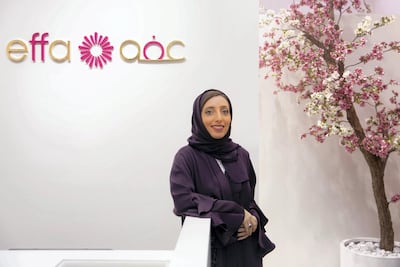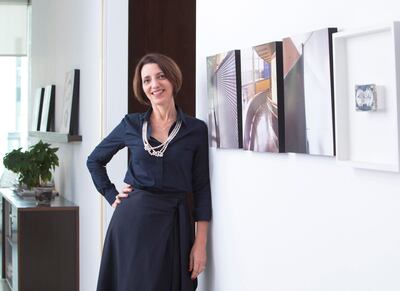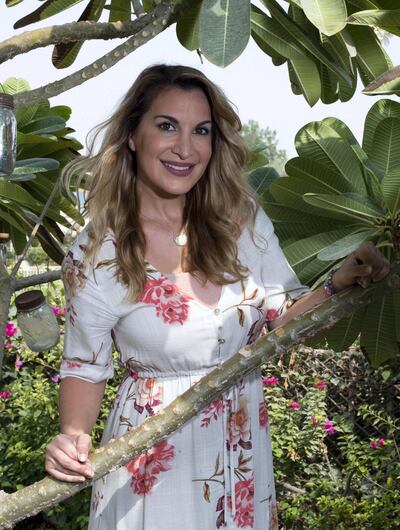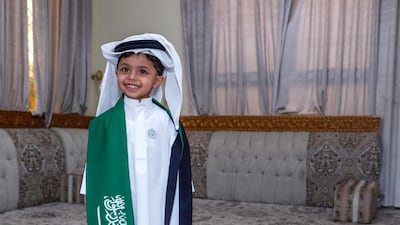As the Kingdom of Saudi Arabia prepares to celebrate its 88th National Day, so does the UAE.
With events taking place across the country this weekend, from fireworks to cultural celebrations, it is clear that the ties between the two countries run deep.
A "home from home" is how some of the Saudi nationals who The National spoke to described it.
“It isn’t our second home - it is home” another said.
Here we meet just some of the many who live in the UAE today, and hear their thoughts on their rapidly changing homeland.

An abaya with a flourish
Effa, an award-winning Saudi designer, first discovered fashion aged 11, when her older sister asked her to create the bridesmaid dresses for her wedding.
Years later, in 2007, she started her own fashion line, Effa, and began designing abayas which were influenced by her Saudi heritage.
She says she chose Dubai as the home for her fashion line in an effort to reflect the close relationship between the UAE and its Saudi neighbour.
"I moved to the UAE 18 years ago with my family when I had the opportunity to work with one of the leading fashion groups in the region," she tells The National.
“I was one of the first designers to rethink the model of the abaya - for it to be in different colours, cuts and shapes; something that wasn’t around at the time.”
Today, Ms Al Dabbagh said she considers her fashion line an Emirati brand “because it was born here and the UAE provided me that market”.
“When I wanted to work there was a more developed fashion industry in the UAE than in Saudi Arabia," she says.
“There was an opportunity for me to gain experience before I started my own line.”
Her label soon began to become recognised at a number of fashion awards in the region. She was also named by Forbes Middle East as one of the Top 100 leaders Inspiring a Kingdom – Saudi Arabia’s Entrepreneurial Elite.
Now, she says she has remained connected to Saudi Arabia.
“I have a lot of Saudi clients because I don’t have my own store there yet,” she says.
“So when they come to the UAE a lot of them make a point of visiting my boutique in Town Centre, Jumeirah.
“I’d say the UAE and Saudi are both considered home for me. I definitely feel at home here and I’m always treated with respect and honoured as a Saudi national.
“When I arrive at the airport in Dubai and I see people celebrating the Saudi National Day it makes me very happy. I feel valued and appreciated.”
Effa is excited to see the changes in Saudi taking shape.
“I think there are a lot of positive things that are making an impact, especially for Saudi young people; women being able to drive is a huge progress... and I think hopefully it will translate into more job opportunities for the youth because we have a huge job population."

The city builder
For Sumaya Al Dabbagh, pursuing a career as an architect in the UAE was always the best option, as the profession was not open to Saudi women at the time.
After graduating from University of Bath in the UK, she worked in London and Paris for a few years before moving to the UAE in 1993.
“I really felt that I wanted to connect with my roots, but at the time Saudi was not an option for me to practice,” says Sumaya, founder of Dabbagh Architects and Effa's sister.
“I had family in Dubai so I came here and I was pleasantly surprised. I didn’t know much about Dubai at the time being such a melting point of different cultures.”
As for being a Saudi national, she said it was unquestionably “the best of both worlds”.
“Obviously Dubai was a booming city so it was kind of an architect’s dream to be working here. As a young architect at the time I had an opportunity to work on big projects.”
Ms Al Dabbagh worked on Children’s City, a project managed by Dubai Municipality which was completed in 2002.
And after founding her own company she worked on Mleiha Archeological Centre in Sharjah which was completed in 2016.
She believes the Emirati and Saudi cultures “complement each other in a way” and that with all of the UAE’s trade shows and business opportunities, the emirates have provided Saudis with a hub to evolve.
Her goal now, she said, was to help evolve the market for architects in the Gulf region so there would not be such a need for foreign talent “to build out cities”.
“It’s been a very good journey for me here and I’m obviously very connected with Saudi Arabia,” she said.
_____________
Read more:
Saudi National Day: Why the UAE has many reasons to celebrate its closest friend and ally
'We are one pulse': UAE's leaders wish Saudi friends well ahead of its national day
Fireworks, concerts and more: Where to celebrate Saudi National Day in Dubai and Abu Dhabi
_____________
A new mother
Ohoud Al Sayari, 26, is due to give birth to her baby in just a few days.
The Saudi national moved to the UAE three years ago but had already fallen in love with the country on visits.
And what does she and her husband plan to name their new baby? “Zayed of course,” she says. “There wasn’t even a doubt in our minds.”
“Before I moved here used to come as a tourist and immediately fell in love with the country. When I found out that I was going to live here, I was thrilled.”
A few months ago, Mrs Al Sayari was hired by Seha, part of Abu Dhabi’s healthcare sector, in customer relations. Since then she said she had met new Saudi nationals at least once a day.
“Many Saudis are married to Emiratis - our ties go as deep as that,” she says. “It isn’t just geographic or economic ties but blood ties as well and nothing makes me happier than witnessing that.”
Mrs Al Sayari says the UAE resembles Saudi Arabia in many ways. “I don’t see any difference which is why I never feel homesick,” she said.
“Our customs are the same, our traditions, our culture. Almost everything. There is no difference other than maybe dialect. We say a few words differently but even that isn’t that big a difference.”
Mrs Al Sayari said she had her first child, Sultan, now two, while living in Saudi Arabia.
“But when I become pregnant for the second time I decided to have it in the UAE at Corniche hospital,” she says. “There is no difference”.
“My family and friends are all here as well so I’ve never felt far away from home. The UAE is home.”

The leadership coach
When Leila Almaeena is asked where she is from, her response is always the same: “I’m from Saudi Arabia but I’m also from the UAE”.
The founder of LA Coaching and Consulting, a Dubai-based life coaching firm, was born to a Saudi father and an American mother. She considers the UAE her home.
“My friends are here, my growth and experiences have been here,” she says. “There are so many beautiful parts of me that blend in the UAE.
“Dubai has been such a beautiful blend of ethnicity, of culture and experiences that really fit with who I am as a person.”
Ms Almaeena moved to Dubai from the US in 2014. “I chose Dubai because it seemed to me to be the land of opportunity.
“They always say that the US is the land of opportunity but actually no, it is the UAE.
“It is open to every type of idea, every kind of experience you can imagine and that was very attractive to me because that is what I wanted and who I was.
“I wanted to be able to talk and meet different cultures and ethnicity – to be friends with them and understand how beautiful we were; not our differences but our similarities.
“This is why the UAE was so attractive to me – it was a land of opportunity and the diversity. The different experiences were very attractive to me.”
Like others who moved to the UAE, she does not feel homesick. “The beautiful thing is that I’m only two hours away from Jeddah so whenever that happens, if that happens, I just jump a flight and I’m there in two hours,” she says.
The similarities between the two nations, she says, were 99 per cent. “They are almost identical” she said. “The identity, the culture, the integrity …we are very similar.
“I see Saudi Arabia going in a beautiful direction and if we continue this way there’ll be no limits to what we can achieve in all sectors.”
She said she would celebrate National Day in the UAE. “I love to see how Emiratis have embraced Saudi so much.
“When I’m here it feels like we are brothers and sisters. Thank you [to the UAE] for valuing me. Thank you for seeing me as your sister. You’ve made me feel home," she said.

The public servant
Ibrahim Yousef Al Ramel, the CEO of Saaed, the road traffic management wing of the UAE's Ministry of Interior, says the Saudi Kingdom’s 88th National Day would be celebrated in every corner of the UAE.
An engineer by trade, he used to visit the UAE regularly before he moved permanently to the country in 2006.
Two years later he was appointed CEO of Saaed. Today, he is the proud father of six children and seven grandchildren.
“In the UAE we don’t just consider Saudi as our brother or sister country but our twin,” he said.
“National Day will be celebrated in every emirate, at every school and in every corner. We feel pride and joy because of this relationship.”
Mr Al Ramel said marking National Day in the UAE would involve celebrations at embassies and consulates, followed by a march by Saudi students in the emirate
He said Saudi films would also be screened at several cinemas and a variety of art exhibitions would be held at the University of Sharjah.

